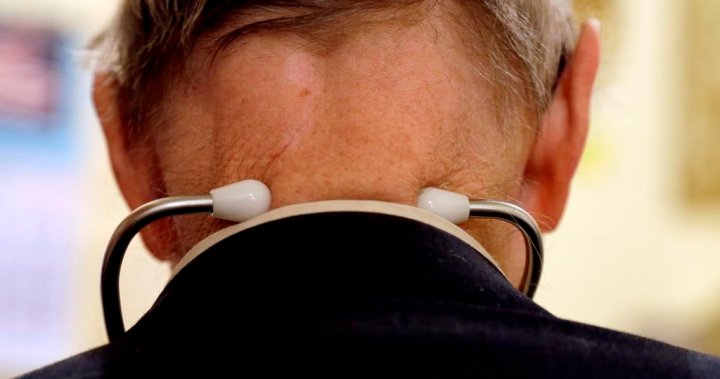In the midst of a family doctor shortage across the country, half of Canadians do not have a primary care physician or have difficulty securing a timely appointment with their current one, according to a recent survey.
The survey, released Thursday by Angus Reid Institute and the Canadian Medical Association (CMA), found that one in five Canadians said they don’t have a family doctor.
For those fortunate enough to have one, the struggle persists, as 29 per cent of respondents said it was difficult to get an appointment. Thirty-seven per cent of respondents said it usually takes a few days to get an appointment with their family doctor, while 15 per cent said they get in right away.
Among Canadians who do not have a family physician, 26 per cent have abandoned their search, while another 38 per cent have been looking for more than a year, the survey found.
“As a family physician working in Canada, I understand and I know the value of primary care,” Dr. Kathleen Ross, president of the CMA, told Global News. “And when you don’t have access to that, there’s delayed diagnosis, difficulty navigating a complex system, patients are left to their own devices to try and sort out their medical concerns. We need to address this urgently.”
A 2022 CMA report found that family physicians reported a higher rate of burnout than other medical or surgical specialists. And 62 per cent of family doctors said increased workload and lack of work-life balance negatively affected their mental health.

More than one in five Canadians — an estimated 6.5 million people — do not have a family physician or nurse practitioner they see regularly, according to a national CMA survey released in April 2023.
And the extent of the shortage varies across the country, according to the CMA survey.
In Ontario, only 13 per cent of respondents reported lacking a family doctor, marking the lowest figure nationwide. In Quebec, this number doubles, with 26 per cent stating they do not have a general practitioner.
The shortage of family doctors is also a huge problem in Atlantic Canada. The survey found that roughly three in five in New Brunswick (61 per cent), Nova Scotia (67 per cent) and Newfoundland and Labrador (58 per cent) said they either don’t have a family doctor or it’s difficult to get an appointment with the one they have.
Recent immigrants to Canada also have difficulty accessing family doctors compared with those who have settled in the country for a longer time. For example, the survey found that 44 per cent of individuals who have been in Canada for less than five years said they do not have a family doctor. In contrast, the number drops for those who have been residents for over two decades, with 14 per cent reporting a similar dilemma.
“I think the average Canadian recognizes now that the health-care system is on its knees,” Ross said.
“The cracks in our system are not new and they do run far too deeply for any one solution or any one entity or any one jurisdiction to solve on their own.”
The survey highlighted that Canadians believe money is part of the solution to fix the country’s broken health-care system, she said, but added that it is “definitely not the whole solution.”

In February, Ottawa announced a health funding deal worth $196.1 billion over 10 years to the provinces and territories, including $46.2 billion in new money.
While a majority of Canadians (60 per cent) believe the funds will improve the health-care system, the majority in this group (51 per cent) believe the gains will be marginal, the survey found.
Two-thirds of Canadians said there are structural issues within the health-care system that cannot be resolved solely through money, according to the survey.
Canadians have priorities for what needs to be addressed and fixed.
For example, ensuring emergency departments are adequately staffed to avoid closures is a top-three priority for 43 per cent of Canadians. Reducing the mental health strain on health-care workers also ranks highly among potential fixes to the system (31 per cent). And reducing wait-lists for family doctors (27 per cent) and surgeries (31 per cent) is also a factor for Canadians.
“Streamlining application for physicians who want to work in Canada from other jurisdictions could be part of our manpower solution,” Ross said. “But we recognize that when we do that, we’re actually taking manpower from other countries and jurisdictions as well.”
She said the CMA has been working to help the mobility of physicians across Canada.
“Having the ability to get a licence in one province and have that licence portable to other areas across Canada would go a long way to helping us address some of our challenges with staffing in rural and remote areas in particular,” she said.
The survey was released the same day the CMA begins hosting its 2023 summit in Ottawa, which runs until Friday. Panels during the conference include addressing the physician shortage in Canada, the balance of public and private health care and systemic racism within the system.
The Angus Reid Institute and the Canadian Medical Association conducted an online survey from Aug. 1 to 8, 2023 among a representative randomized sample of 5,010 Canadian adults who are members of Angus Reid Forum. For comparison purposes only, a probability sample of this size would carry a margin of error of +/- 1 percentage points, 19 times out of 20. Discrepancies in or between totals are due to rounding. The survey was self-commissioned and paid for jointly by ARI and CMA.
© 2023 Global News, a division of Corus Entertainment Inc.




